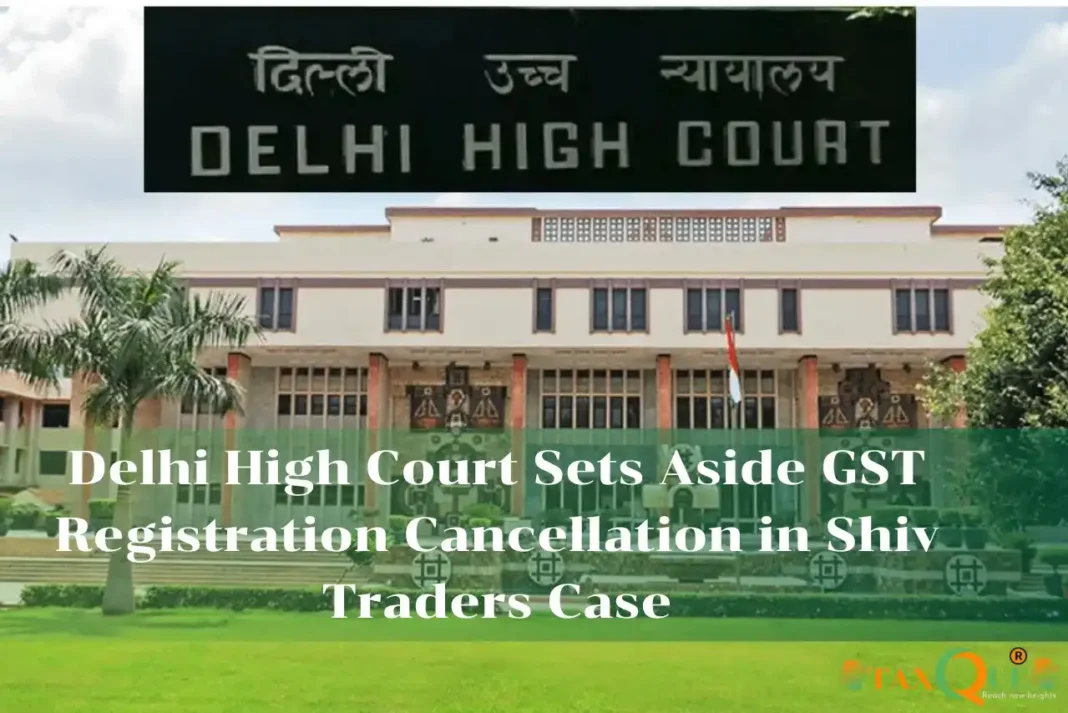Justice Restored: Delhi HC Reverses GST Cancellation for Shiv Traders Due to Procedural Lapse
Introduction
In a landmark decision safeguarding taxpayer rights, the Delhi High Court in W.P.(C) 14781/2024 has ruled in favor of Shiv Traders, a business entity whose GST registration was cancelled retrospectively due to alleged non-existence at its principal place of business. The Court emphasized the need for procedural fairness, transparency, and proper opportunity to be heard before such drastic actions are taken. Let’s break down this important case and what it means for taxpayers and authorities alike.
🧾 Case Summary: Shiv Traders v. Principal Commissioner, DGST (2025)
| Particulars | Details |
|---|---|
| Court | Delhi High Court |
| Case No. | W.P.(C) 14781/2024 |
| Order Date | 13 May 2025 |
| Bench | Justice Prathiba M. Singh & Justice Rajneesh Kumar Gupta |
| Petitioner | Shiv Traders |
| Respondents | Principal Commissioner, Delhi GST & Another |
| Issue | Cancellation of GST registration without serving field visit report or proper hearing |
| Key Allegation | GST registration cancelled based on unserved SCN and a non-existent reply |
| Court Findings | – Violation of natural justice – No proper opportunity to be heard – Field report not shared |
| Final Order | – Cancellation order set aside – Matter remanded – Fresh opportunity to reply by 10 July 2025 |
| GST Portal Access | Restored for uploading reply & accessing documents |
| Legal Relevance | Upholds taxpayer rights under CGST Act and constitutional provisions |
| Citation | Delhi High Court – W.P.(C) 14781/2024 |
Background of the Case
- The GST registration of Shiv Traders was cancelled via an order dated 12 March 2021, with retrospective effect from 21 August 2017.
- The cancellation was based on a field visit, during which the department claimed the business was “not found” at its registered premises.
- A Show Cause Notice (SCN) dated 13 January 2021 was issued, but the petitioner alleged no opportunity was given to respond, and the field visit report was never shared.
- The impugned order claimed that a reply dated 22 January 2021 was received—a fact disputed by the petitioner.
High Court Observations
- Violation of Natural Justice:
The Court noted that the petitioner was denied a fair opportunity to respond to the SCN, and no reply was filed—yet the department proceeded as if a reply had been submitted. - Field Visit Report Not Shared:
A key piece of evidence—the field verification report—was never provided to the petitioner, making it impossible to defend against the cancellation. - Set Aside and Remand:
The Court set aside the cancellation order and remanded the matter to the Adjudicating Authority for fresh consideration. - Timeline Provided:
The petitioner was allowed to submit a reply by 10 July 2025, and the department was directed to issue a personal hearing notice thereafter. - Access to GST Portal Restored:
Access to the GST portal was also reinstated to allow the petitioner to file the necessary documents.
Legal Principles Applied
- Article 14 & 19(1)(g) of the Constitution – Upholding equality and the right to trade/business.
- Principles of Natural Justice – No order affecting civil rights should be passed without an opportunity of being heard.
- Section 29 of CGST Act, 2017 – Governs cancellation of GST registration, subject to due process.
Key Takeaways for Taxpayers
✅ Always demand a copy of the field visit report if your registration is at risk.
✅ Track and respond promptly to SCNs—even if you believe no wrongdoing occurred.
✅ Keep all contact details (email, mobile) updated on the GST portal.
✅ If unfairly treated, approach the High Court under Article 226 for redressal.
Conclusion
The Shiv Traders case is a powerful reminder that bureaucratic overreach cannot override due process. The Delhi High Court’s order not only reinstates a business’s right to trade but also reinforces the need for procedural transparency under GST laws. As India continues to digitize its tax regime, ensuring fairness, communication, and clarity becomes critical—both for authorities and taxpayers.





